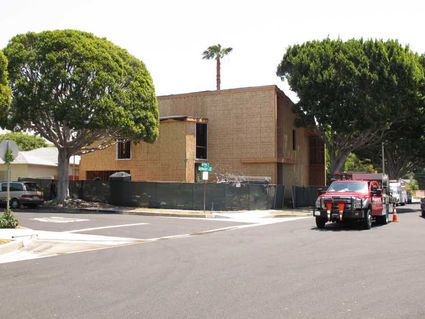A Vote For Mansionization
Council Nixes Moratorium On Larger Homes
June 11, 2015
By Lynne Bronstein
Observer Reporter
Despite the growing rallying cry around Los Angeles against "mansionization"-the building of larger single-family homes in residential neighborhoods-the City Council did not vote for a moratorium on the matter at their June 8 meeting.
The Council's vote was 3-2 against a moratorium, with Meghan Sahli-Wells and Jim Clarke supporting the idea and the others opposing it.
Mansionization is typically defined as the practice of replacing older, smaller homes with the largest home permitted under city zoning codes. Because these new homes are much larger than surrounding dwellings they can change the character and scale of a neighborhood.
Several Los Angeles neighborhoods have passed temporary moratoriums on new building.
At the council meeting, the outcome seemed to be going against the possibility of passing a moratorium when the tone of the speakers in public comment turned from favoring action against larger homes to speakers who defended the right of homeowners to build and buy homes according to their tastes and needs.
One of the speakers described how homes were built to smaller specifications in the 1930s while today "Millenials don't want smaller homes."
Chamber of Commerce president Steven Rose said he was vehemently opposed" to a moratorium and warned the Council not to act out of "fear."
One woman showed pictures of larger homes that were in her opinion, "environmentally sensitive" compared to smaller homes that she said were "fire hazards."
The speakers who wanted to see regulations established to keep residences from being too large for their surroundings brought photos of buildings that did indeed seem cumbersome.
Ross Hawkins displayed a photo of his garage with a very large A-frame roof behind it. The roof, he said, was that of a two-story "storage facility" as he had been told it was. But "what kind of storage facility has two picture windows?" he wondered.
Council meeting regular and poet commentator Dr. Janet Hoult was annoyed by a large building at the junction of Motor and Le Bourget near her home, which had inspired her lines:
"A house that is overgrown and large doesn't look like a home, but more like a barge."
There were 20 speakers in total and they were divided half and half on the moratorium. The speakers who favored a moratorium were from Carlson Park, an area where residents feel there have been too many huge homes built in the last three years.
But what constitutes an oversized home?
Community Development Director Sol Blumenfeld, in the city's staff report, noted that there were different ways of seeing the problem.
"Land use planning professionals may see the issue as one of the proper relationship of the building size to the lot size given the surrounding neighborhood. Architects may see it as the relationship of the building design to the design of surrounding buildings in the neighborhood," said Blumenfeld.
There also isn't a "one size fits all" option, as some neighborhoods don't find it an issue to have homes of different sizes while in other areas, larger homes create difficulties for residents on lots adjacent to larger buildings.
"With such a divergence of opinions it's not easy to craft regulations that will satisfy everyone's need," observed Blumenfeld.
While no actual building size has been defined as "a mansion," it is generally thought that a 3,000 square foot building on a 5000 square foot lot is a "larger sized home."
Blumenfeld said the council had options to give relief to those opposed to larger homes: they could reduce maximum dwelling size; establish a "floor area ratio" or a cubic building footage ratio (the ratio of cubic building area (length x height x depth) divided by the lot size), establish stricter building standards, or restrict the construction of additional floors.
Asked to make recommendations to staff, the council agreed that it is important to maintain the character of a neighborhood and that the city's planning commission should study the situation and see what can be done to amend the zoning codes.
In the meantime, the anti-mansionization activists are holding a meeting on June 14 at the Veteran's Auditorium, from 7 p.m. to 8:30.




















Reader Comments(0)